Essay: Beijing Bicycle's Reflection of Contemporary Chinese Society
VerifiedAdded on 2023/03/23
|5
|1372
|61
Essay
AI Summary
This essay provides an in-depth analysis of the Chinese film "Beijing Bicycle," examining its portrayal of contemporary Chinese society. The essay focuses on how the film depicts the struggles and realities of individuals in Beijing, particularly two seventeen-year-old boys, Guei and Jian. It explores the film's narrative structure, characters, and cinematic techniques to understand how the directors convey their message about societal disparities, the impact of capitalism, and the importance of character development. The analysis highlights the contrast between the two protagonists, one struggling financially and the other from a wealthier background, and how their actions and interactions reveal the complexities of human behavior and the values emphasized within the film. The essay also discusses the film's potential impact on the audience and its ability to reflect broader societal issues beyond the immediate context of China.
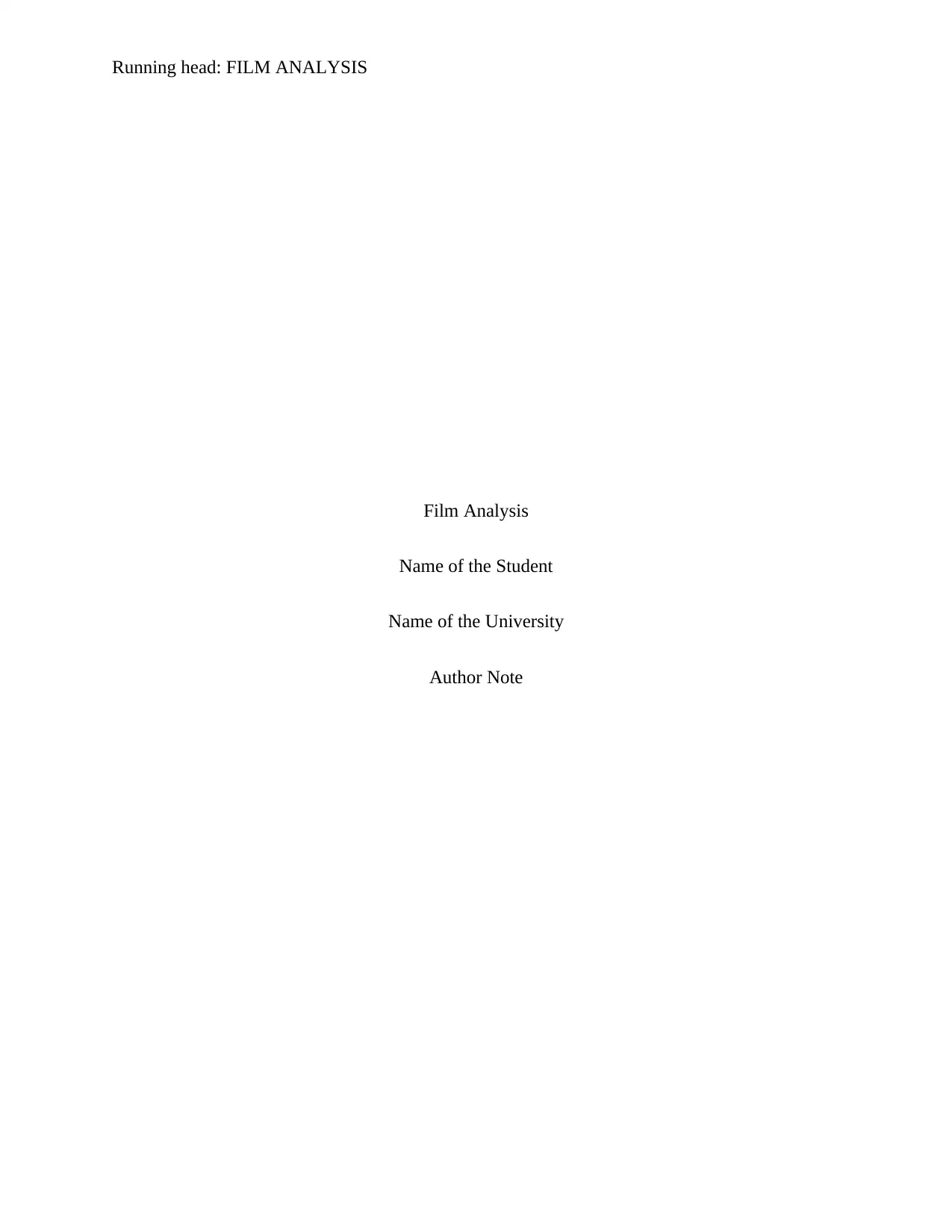
Running head: FILM ANALYSIS
Film Analysis
Name of the Student
Name of the University
Author Note
Film Analysis
Name of the Student
Name of the University
Author Note
Paraphrase This Document
Need a fresh take? Get an instant paraphrase of this document with our AI Paraphraser
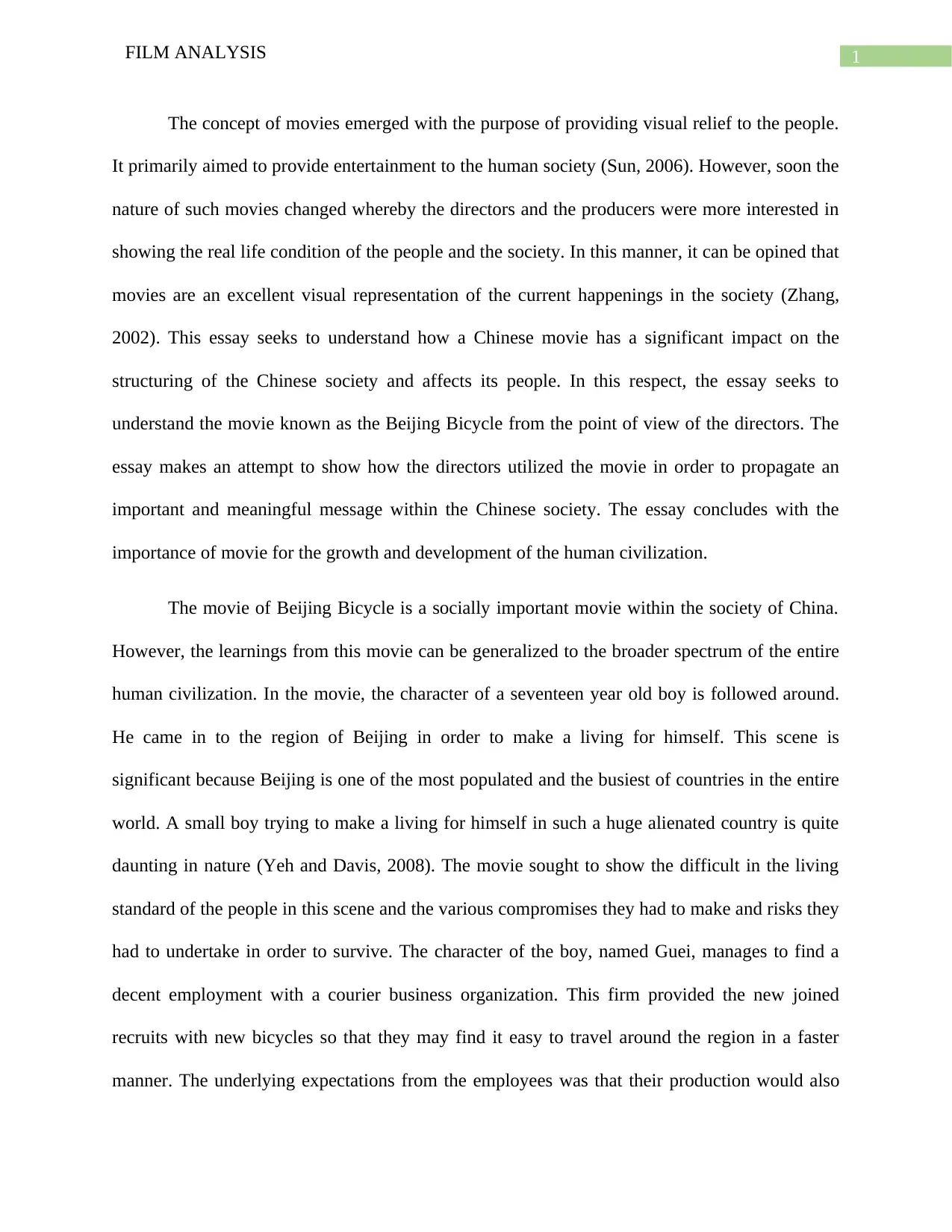
1FILM ANALYSIS
The concept of movies emerged with the purpose of providing visual relief to the people.
It primarily aimed to provide entertainment to the human society (Sun, 2006). However, soon the
nature of such movies changed whereby the directors and the producers were more interested in
showing the real life condition of the people and the society. In this manner, it can be opined that
movies are an excellent visual representation of the current happenings in the society (Zhang,
2002). This essay seeks to understand how a Chinese movie has a significant impact on the
structuring of the Chinese society and affects its people. In this respect, the essay seeks to
understand the movie known as the Beijing Bicycle from the point of view of the directors. The
essay makes an attempt to show how the directors utilized the movie in order to propagate an
important and meaningful message within the Chinese society. The essay concludes with the
importance of movie for the growth and development of the human civilization.
The movie of Beijing Bicycle is a socially important movie within the society of China.
However, the learnings from this movie can be generalized to the broader spectrum of the entire
human civilization. In the movie, the character of a seventeen year old boy is followed around.
He came in to the region of Beijing in order to make a living for himself. This scene is
significant because Beijing is one of the most populated and the busiest of countries in the entire
world. A small boy trying to make a living for himself in such a huge alienated country is quite
daunting in nature (Yeh and Davis, 2008). The movie sought to show the difficult in the living
standard of the people in this scene and the various compromises they had to make and risks they
had to undertake in order to survive. The character of the boy, named Guei, manages to find a
decent employment with a courier business organization. This firm provided the new joined
recruits with new bicycles so that they may find it easy to travel around the region in a faster
manner. The underlying expectations from the employees was that their production would also
The concept of movies emerged with the purpose of providing visual relief to the people.
It primarily aimed to provide entertainment to the human society (Sun, 2006). However, soon the
nature of such movies changed whereby the directors and the producers were more interested in
showing the real life condition of the people and the society. In this manner, it can be opined that
movies are an excellent visual representation of the current happenings in the society (Zhang,
2002). This essay seeks to understand how a Chinese movie has a significant impact on the
structuring of the Chinese society and affects its people. In this respect, the essay seeks to
understand the movie known as the Beijing Bicycle from the point of view of the directors. The
essay makes an attempt to show how the directors utilized the movie in order to propagate an
important and meaningful message within the Chinese society. The essay concludes with the
importance of movie for the growth and development of the human civilization.
The movie of Beijing Bicycle is a socially important movie within the society of China.
However, the learnings from this movie can be generalized to the broader spectrum of the entire
human civilization. In the movie, the character of a seventeen year old boy is followed around.
He came in to the region of Beijing in order to make a living for himself. This scene is
significant because Beijing is one of the most populated and the busiest of countries in the entire
world. A small boy trying to make a living for himself in such a huge alienated country is quite
daunting in nature (Yeh and Davis, 2008). The movie sought to show the difficult in the living
standard of the people in this scene and the various compromises they had to make and risks they
had to undertake in order to survive. The character of the boy, named Guei, manages to find a
decent employment with a courier business organization. This firm provided the new joined
recruits with new bicycles so that they may find it easy to travel around the region in a faster
manner. The underlying expectations from the employees was that their production would also
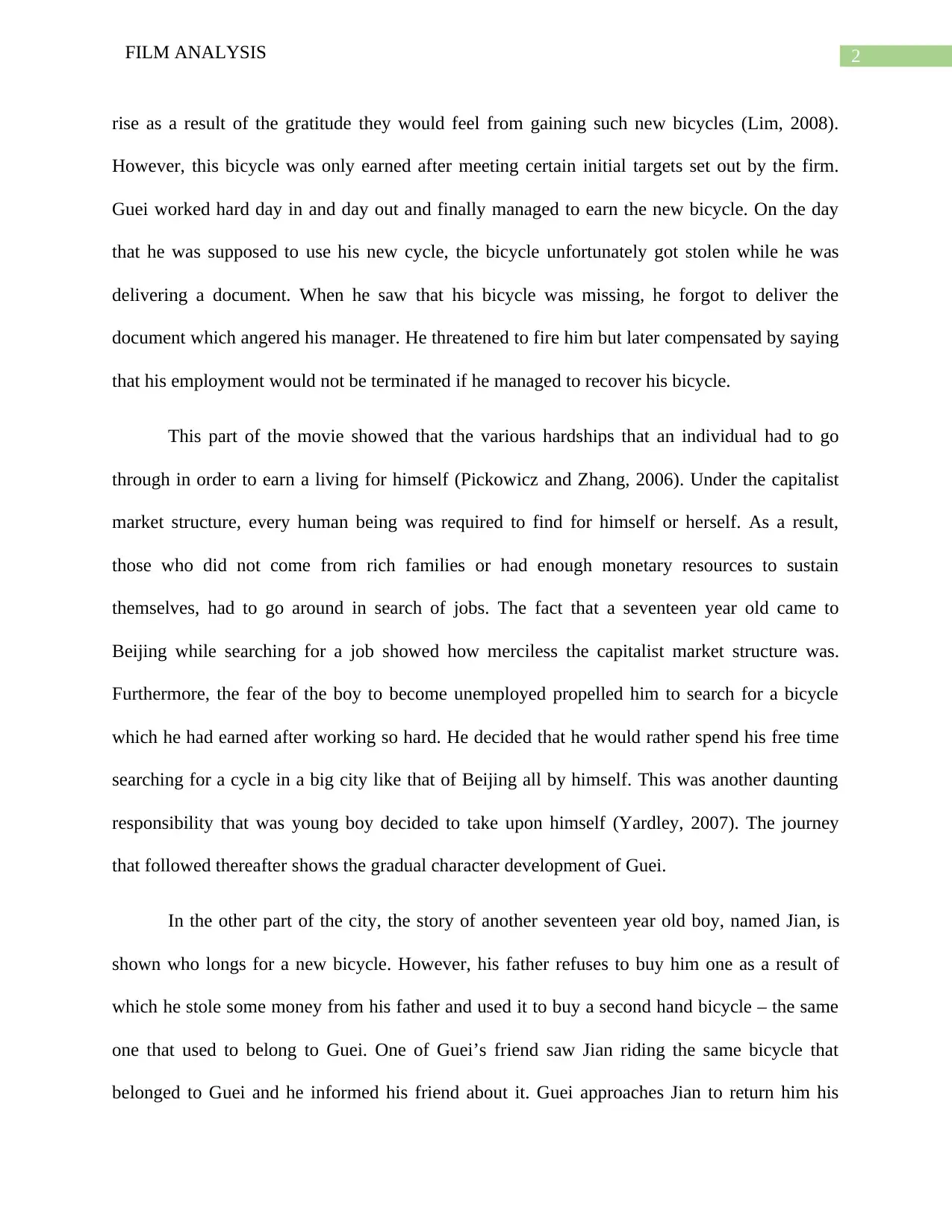
2FILM ANALYSIS
rise as a result of the gratitude they would feel from gaining such new bicycles (Lim, 2008).
However, this bicycle was only earned after meeting certain initial targets set out by the firm.
Guei worked hard day in and day out and finally managed to earn the new bicycle. On the day
that he was supposed to use his new cycle, the bicycle unfortunately got stolen while he was
delivering a document. When he saw that his bicycle was missing, he forgot to deliver the
document which angered his manager. He threatened to fire him but later compensated by saying
that his employment would not be terminated if he managed to recover his bicycle.
This part of the movie showed that the various hardships that an individual had to go
through in order to earn a living for himself (Pickowicz and Zhang, 2006). Under the capitalist
market structure, every human being was required to find for himself or herself. As a result,
those who did not come from rich families or had enough monetary resources to sustain
themselves, had to go around in search of jobs. The fact that a seventeen year old came to
Beijing while searching for a job showed how merciless the capitalist market structure was.
Furthermore, the fear of the boy to become unemployed propelled him to search for a bicycle
which he had earned after working so hard. He decided that he would rather spend his free time
searching for a cycle in a big city like that of Beijing all by himself. This was another daunting
responsibility that was young boy decided to take upon himself (Yardley, 2007). The journey
that followed thereafter shows the gradual character development of Guei.
In the other part of the city, the story of another seventeen year old boy, named Jian, is
shown who longs for a new bicycle. However, his father refuses to buy him one as a result of
which he stole some money from his father and used it to buy a second hand bicycle – the same
one that used to belong to Guei. One of Guei’s friend saw Jian riding the same bicycle that
belonged to Guei and he informed his friend about it. Guei approaches Jian to return him his
rise as a result of the gratitude they would feel from gaining such new bicycles (Lim, 2008).
However, this bicycle was only earned after meeting certain initial targets set out by the firm.
Guei worked hard day in and day out and finally managed to earn the new bicycle. On the day
that he was supposed to use his new cycle, the bicycle unfortunately got stolen while he was
delivering a document. When he saw that his bicycle was missing, he forgot to deliver the
document which angered his manager. He threatened to fire him but later compensated by saying
that his employment would not be terminated if he managed to recover his bicycle.
This part of the movie showed that the various hardships that an individual had to go
through in order to earn a living for himself (Pickowicz and Zhang, 2006). Under the capitalist
market structure, every human being was required to find for himself or herself. As a result,
those who did not come from rich families or had enough monetary resources to sustain
themselves, had to go around in search of jobs. The fact that a seventeen year old came to
Beijing while searching for a job showed how merciless the capitalist market structure was.
Furthermore, the fear of the boy to become unemployed propelled him to search for a bicycle
which he had earned after working so hard. He decided that he would rather spend his free time
searching for a cycle in a big city like that of Beijing all by himself. This was another daunting
responsibility that was young boy decided to take upon himself (Yardley, 2007). The journey
that followed thereafter shows the gradual character development of Guei.
In the other part of the city, the story of another seventeen year old boy, named Jian, is
shown who longs for a new bicycle. However, his father refuses to buy him one as a result of
which he stole some money from his father and used it to buy a second hand bicycle – the same
one that used to belong to Guei. One of Guei’s friend saw Jian riding the same bicycle that
belonged to Guei and he informed his friend about it. Guei approaches Jian to return him his
⊘ This is a preview!⊘
Do you want full access?
Subscribe today to unlock all pages.

Trusted by 1+ million students worldwide
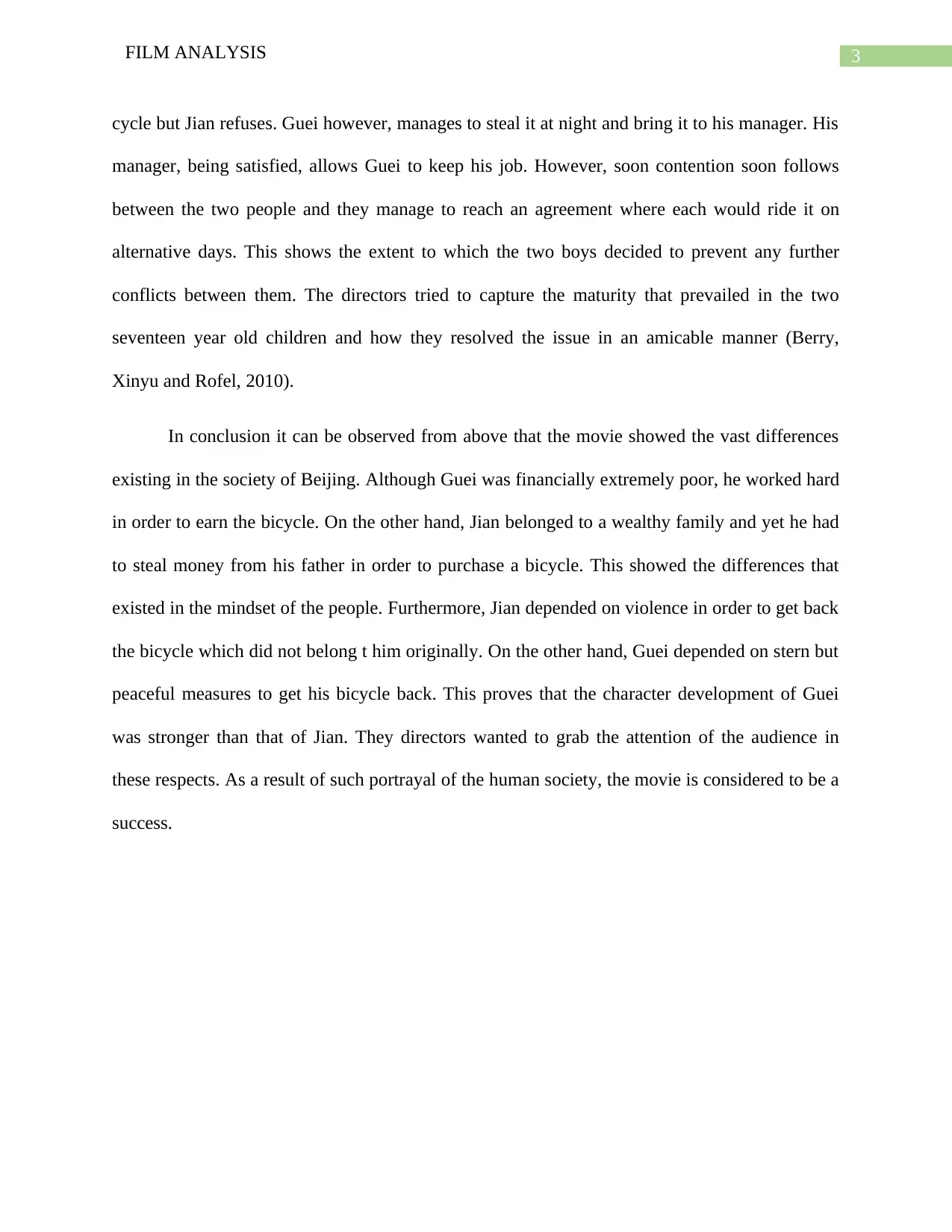
3FILM ANALYSIS
cycle but Jian refuses. Guei however, manages to steal it at night and bring it to his manager. His
manager, being satisfied, allows Guei to keep his job. However, soon contention soon follows
between the two people and they manage to reach an agreement where each would ride it on
alternative days. This shows the extent to which the two boys decided to prevent any further
conflicts between them. The directors tried to capture the maturity that prevailed in the two
seventeen year old children and how they resolved the issue in an amicable manner (Berry,
Xinyu and Rofel, 2010).
In conclusion it can be observed from above that the movie showed the vast differences
existing in the society of Beijing. Although Guei was financially extremely poor, he worked hard
in order to earn the bicycle. On the other hand, Jian belonged to a wealthy family and yet he had
to steal money from his father in order to purchase a bicycle. This showed the differences that
existed in the mindset of the people. Furthermore, Jian depended on violence in order to get back
the bicycle which did not belong t him originally. On the other hand, Guei depended on stern but
peaceful measures to get his bicycle back. This proves that the character development of Guei
was stronger than that of Jian. They directors wanted to grab the attention of the audience in
these respects. As a result of such portrayal of the human society, the movie is considered to be a
success.
cycle but Jian refuses. Guei however, manages to steal it at night and bring it to his manager. His
manager, being satisfied, allows Guei to keep his job. However, soon contention soon follows
between the two people and they manage to reach an agreement where each would ride it on
alternative days. This shows the extent to which the two boys decided to prevent any further
conflicts between them. The directors tried to capture the maturity that prevailed in the two
seventeen year old children and how they resolved the issue in an amicable manner (Berry,
Xinyu and Rofel, 2010).
In conclusion it can be observed from above that the movie showed the vast differences
existing in the society of Beijing. Although Guei was financially extremely poor, he worked hard
in order to earn the bicycle. On the other hand, Jian belonged to a wealthy family and yet he had
to steal money from his father in order to purchase a bicycle. This showed the differences that
existed in the mindset of the people. Furthermore, Jian depended on violence in order to get back
the bicycle which did not belong t him originally. On the other hand, Guei depended on stern but
peaceful measures to get his bicycle back. This proves that the character development of Guei
was stronger than that of Jian. They directors wanted to grab the attention of the audience in
these respects. As a result of such portrayal of the human society, the movie is considered to be a
success.
Paraphrase This Document
Need a fresh take? Get an instant paraphrase of this document with our AI Paraphraser
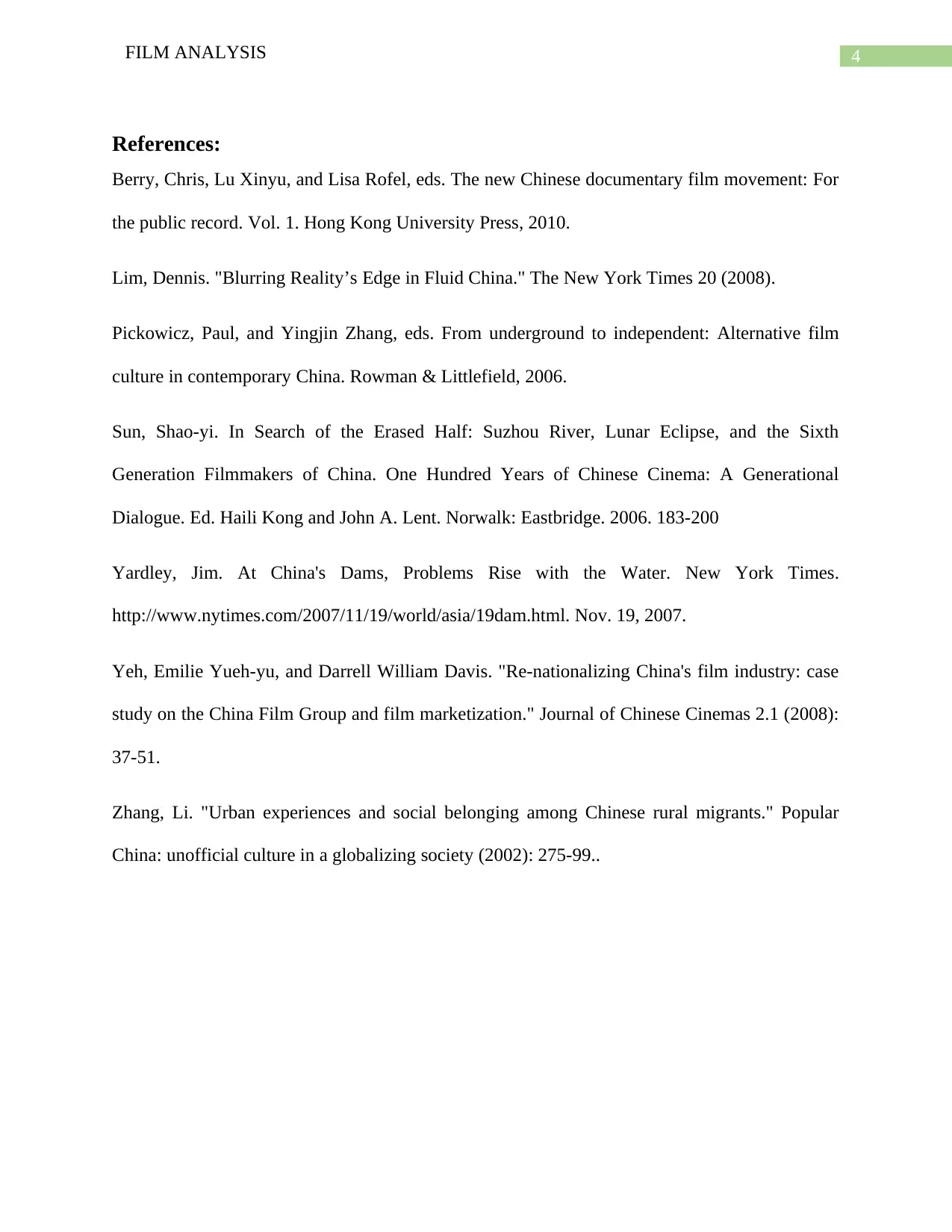
4FILM ANALYSIS
References:
Berry, Chris, Lu Xinyu, and Lisa Rofel, eds. The new Chinese documentary film movement: For
the public record. Vol. 1. Hong Kong University Press, 2010.
Lim, Dennis. "Blurring Reality’s Edge in Fluid China." The New York Times 20 (2008).
Pickowicz, Paul, and Yingjin Zhang, eds. From underground to independent: Alternative film
culture in contemporary China. Rowman & Littlefield, 2006.
Sun, Shao-yi. In Search of the Erased Half: Suzhou River, Lunar Eclipse, and the Sixth
Generation Filmmakers of China. One Hundred Years of Chinese Cinema: A Generational
Dialogue. Ed. Haili Kong and John A. Lent. Norwalk: Eastbridge. 2006. 183-200
Yardley, Jim. At China's Dams, Problems Rise with the Water. New York Times.
http://www.nytimes.com/2007/11/19/world/asia/19dam.html. Nov. 19, 2007.
Yeh, Emilie Yueh-yu, and Darrell William Davis. "Re-nationalizing China's film industry: case
study on the China Film Group and film marketization." Journal of Chinese Cinemas 2.1 (2008):
37-51.
Zhang, Li. "Urban experiences and social belonging among Chinese rural migrants." Popular
China: unofficial culture in a globalizing society (2002): 275-99..
References:
Berry, Chris, Lu Xinyu, and Lisa Rofel, eds. The new Chinese documentary film movement: For
the public record. Vol. 1. Hong Kong University Press, 2010.
Lim, Dennis. "Blurring Reality’s Edge in Fluid China." The New York Times 20 (2008).
Pickowicz, Paul, and Yingjin Zhang, eds. From underground to independent: Alternative film
culture in contemporary China. Rowman & Littlefield, 2006.
Sun, Shao-yi. In Search of the Erased Half: Suzhou River, Lunar Eclipse, and the Sixth
Generation Filmmakers of China. One Hundred Years of Chinese Cinema: A Generational
Dialogue. Ed. Haili Kong and John A. Lent. Norwalk: Eastbridge. 2006. 183-200
Yardley, Jim. At China's Dams, Problems Rise with the Water. New York Times.
http://www.nytimes.com/2007/11/19/world/asia/19dam.html. Nov. 19, 2007.
Yeh, Emilie Yueh-yu, and Darrell William Davis. "Re-nationalizing China's film industry: case
study on the China Film Group and film marketization." Journal of Chinese Cinemas 2.1 (2008):
37-51.
Zhang, Li. "Urban experiences and social belonging among Chinese rural migrants." Popular
China: unofficial culture in a globalizing society (2002): 275-99..
1 out of 5
Related Documents
Your All-in-One AI-Powered Toolkit for Academic Success.
+13062052269
info@desklib.com
Available 24*7 on WhatsApp / Email
![[object Object]](/_next/static/media/star-bottom.7253800d.svg)
Unlock your academic potential
Copyright © 2020–2026 A2Z Services. All Rights Reserved. Developed and managed by ZUCOL.





